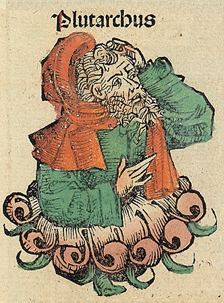Plutarch
[[File:Head_of_a_philosopher_-_Archaeological_Museum_of_Delphi.jpg_-->|Head of a philosopher - Archaeological Museum of Delphi -->|thumb]]
Plutarch (c. AD 46 – after 119) was a Greek biographer and essayist, known primarily for his Parallel Lives and Moralia. He is considered one of the most significant ancient historians, whose work has had a profound influence on the literature and historiography of the Western world.
Life[edit | edit source]
Plutarch was born in the small town of Chaeronea, in the Greek region of Boeotia, around the year AD 46. Little is known about his early life, but it is believed that he received a comprehensive education in philosophy, rhetoric, and mathematics. Plutarch traveled widely in the Roman Empire, including visits to Rome and Alexandria, which exposed him to a wide range of cultures and intellectual currents.
He spent most of his life in Chaeronea, where he was involved in local politics and served as a priest at the temple of Apollo at Delphi. Plutarch's social status and connections with the Roman elite allowed him access to the highest circles of society, where he became a sought-after teacher and lecturer.
Works[edit | edit source]
Plutarch's most famous work, the Parallel Lives, is a series of biographies of famous Greek and Roman men, arranged in pairs to illuminate their common moral virtues or failings. The Parallel Lives includes biographies of such notable figures as Alexander the Great, Julius Caesar, and Lycurgus. Through these comparative biographies, Plutarch aimed to provide moral examples that readers could learn from.
In addition to the Parallel Lives, Plutarch wrote the Moralia, a collection of essays, dialogues, and letters on a wide range of topics, including ethics, religion, politics, and literature. The Moralia reflects Plutarch's interest in the moral philosophy of the Socratic tradition and his belief in the importance of philosophical inquiry for the improvement of society.
Philosophy[edit | edit source]
Plutarch was a Middle Platonist, and his philosophical views were deeply influenced by Plato's teachings. However, he also incorporated elements from other philosophical schools, such as the Stoics and Epicureans, into his thought. Plutarch's philosophy emphasized the importance of virtue and the moral development of the individual. He believed that the study of the lives of great men could inspire readers to improve their own characters and strive for moral excellence.
Legacy[edit | edit source]
Plutarch's works have had a lasting impact on Western literature and thought. His biographies have been immensely popular throughout history, inspiring countless other writers, including William Shakespeare, Ralph Waldo Emerson, and Montaigne. Plutarch's influence extends beyond literature into the realms of history, philosophy, and education, where his emphasis on moral character and the value of historical examples has continued to resonate.
Search WikiMD
Ad.Tired of being Overweight? Try W8MD's physician weight loss program.
Semaglutide (Ozempic / Wegovy and Tirzepatide (Mounjaro / Zepbound) available.
Advertise on WikiMD
|
WikiMD's Wellness Encyclopedia |
| Let Food Be Thy Medicine Medicine Thy Food - Hippocrates |
Translate this page: - East Asian
中文,
日本,
한국어,
South Asian
हिन्दी,
தமிழ்,
తెలుగు,
Urdu,
ಕನ್ನಡ,
Southeast Asian
Indonesian,
Vietnamese,
Thai,
မြန်မာဘာသာ,
বাংলা
European
español,
Deutsch,
français,
Greek,
português do Brasil,
polski,
română,
русский,
Nederlands,
norsk,
svenska,
suomi,
Italian
Middle Eastern & African
عربى,
Turkish,
Persian,
Hebrew,
Afrikaans,
isiZulu,
Kiswahili,
Other
Bulgarian,
Hungarian,
Czech,
Swedish,
മലയാളം,
मराठी,
ਪੰਜਾਬੀ,
ગુજરાતી,
Portuguese,
Ukrainian
Medical Disclaimer: WikiMD is not a substitute for professional medical advice. The information on WikiMD is provided as an information resource only, may be incorrect, outdated or misleading, and is not to be used or relied on for any diagnostic or treatment purposes. Please consult your health care provider before making any healthcare decisions or for guidance about a specific medical condition. WikiMD expressly disclaims responsibility, and shall have no liability, for any damages, loss, injury, or liability whatsoever suffered as a result of your reliance on the information contained in this site. By visiting this site you agree to the foregoing terms and conditions, which may from time to time be changed or supplemented by WikiMD. If you do not agree to the foregoing terms and conditions, you should not enter or use this site. See full disclaimer.
Credits:Most images are courtesy of Wikimedia commons, and templates, categories Wikipedia, licensed under CC BY SA or similar.
Contributors: Prab R. Tumpati, MD



